Gestation Period within Female Koalas
The female koalas normally have the gestation period of just 34 to 36 days only. Even though this gestation period is very short (a few weeks or so) but it is very normal considering the fact that koalas are the marsupial mammals. The young ones that are born after the gestation period of 34 to 36 days are called neonates or the koala neonates.
Female koalas have the gestation period of just 34 to 36 days only. Koalas have short gestation period because they are marsupial mammals and marsupials have the shortest gestation period among all the mammals.
The koala neonates are always under-developed at the time of birth (post gestation period) and scientifically they are said to be born in the form of an embryonic state. For example, they have no eyes, under-developed hind limbs and tiniest of forelimbs etc. Yet still right after the birth they manage to reach their mother's pouch and attach their mouth to the mother's teat to suckle mother's milk.
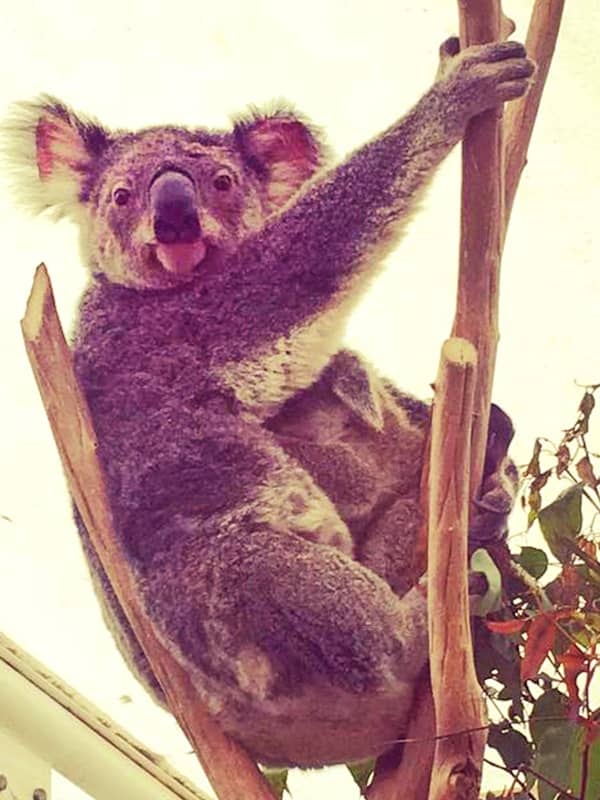
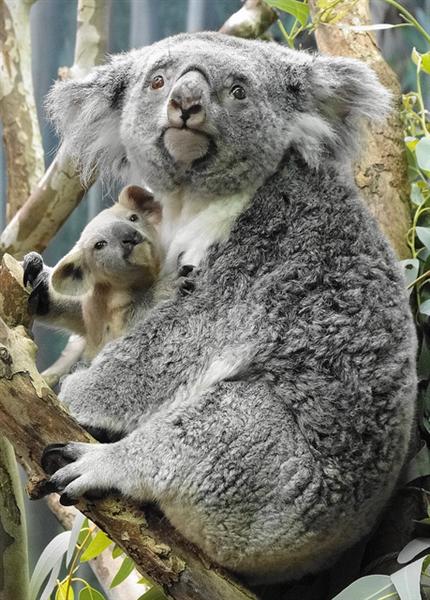
Despite the fact that koalas have a very short gestation period but within the marsupial's family it is reasonably one of the longest gestation periods. Wombats which are the closest cousins of koalas and they have the gestation period of just 20 to 21 days only. The longest gestation period within marsupials is of the Antilopine kangaroos which is in between 41 to 42 days respectively.
Koalas have one of the longest gestation periods within the marsupial family as they are only behind kangaroos and tree-kangaroos in this regard.
On the other hand; the shortest gestation period within marsupials belongs to dunnarts which is just 10 days only. Therefore; the gestation period of koalas is one of the longest ones within the marsupials and they are only behind kangaroos and tree kangaroos etc. Lastly; Elephants have the largest gestation period within the mammalian family which lasts for about 20 to 22 months.
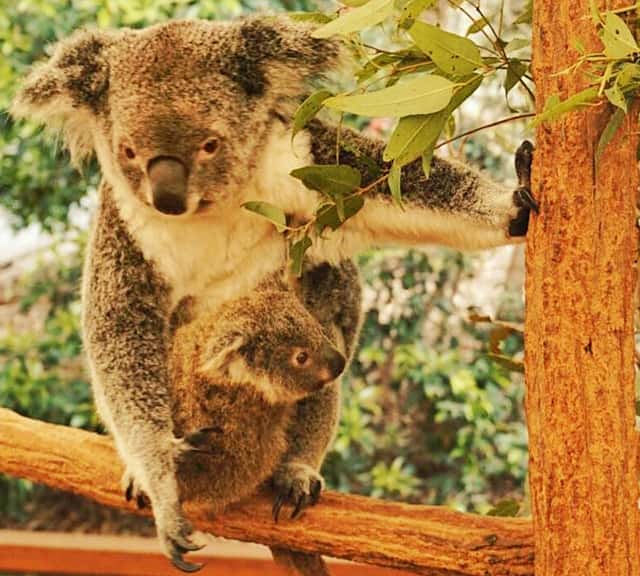
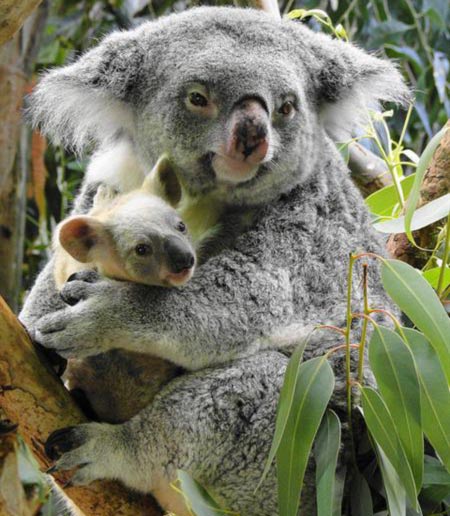
Female koalas also boost up their diet plan (food consumption) during the gestation period. It has been noted that during the gestation period, the female koalas eat 36 percent more Eucalyptus leaves as compared to the other months, when they are not pregnant. They also chew and re-chew more and more Eucalyptus leaves to extract maximum energy for their bodies and also for their young ones.
Female koalas consume 36 percent more Eucalyptus leaves during the gestation period. Furthermore; their chewing and re-chewing interval also increases during the gestation period.
Furthermore; they also spend reasonable time in choosing the Eucalyptus leaves that are best in terms of the nutritional value as well. Koalas have good sense of smell and they can easily detect by smelling that which Eucalyptus leaves are nutritious, poisonous or lacking in nutrition.
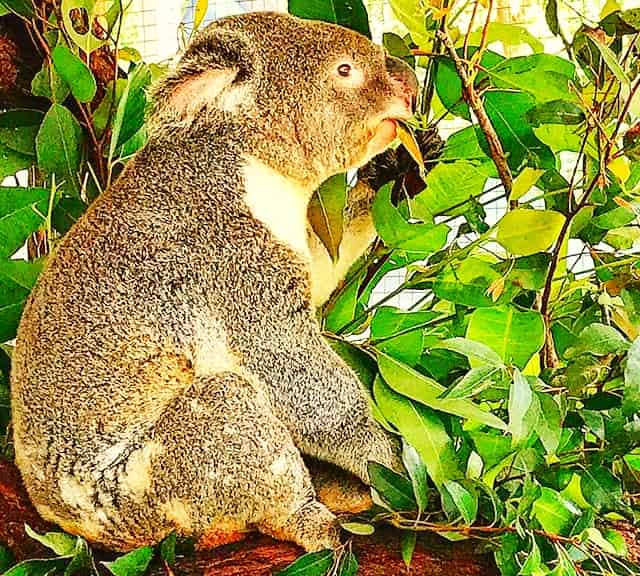
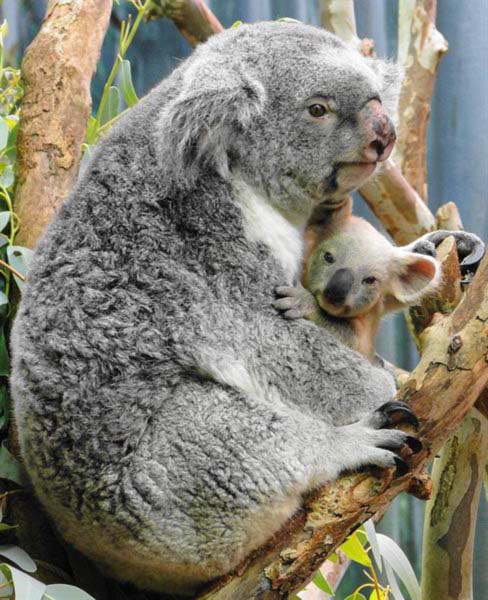
However; having this short gestation period has its pros and cons for the female koalas. Some biologists do believe that shorter gestation period for the female koalas mean that they have a relatively easier pregnancy as compared to the non-marsupial mammals. They also believe that short gestation period means that a female koala doesn't need to carry a large neonate inside its body but inside its couch which is a relatively easier job.
Having a short gestation period has its benefits and drawback for the female koalas.
Furthermore; this kind of pregnancy allow the mother koalas to suffer the least in case of any mishap such as lack of food, accident and fall etc. On the other hand; short gestation period within female koalas also mean that their neonates are vulnerable to different diseases and accidents. Moreover; the mother koalas have to take care of them in their pouch for almost 8 to 9 months more after their birth.
Female koalas can have ease of pregnancy, less burden to carry while pregnant and less suffering in case of accident.
Biggest drawback is that their neonates are directly exposed to external environment which means that they can be vulnerable to different diseases and viruses etc.
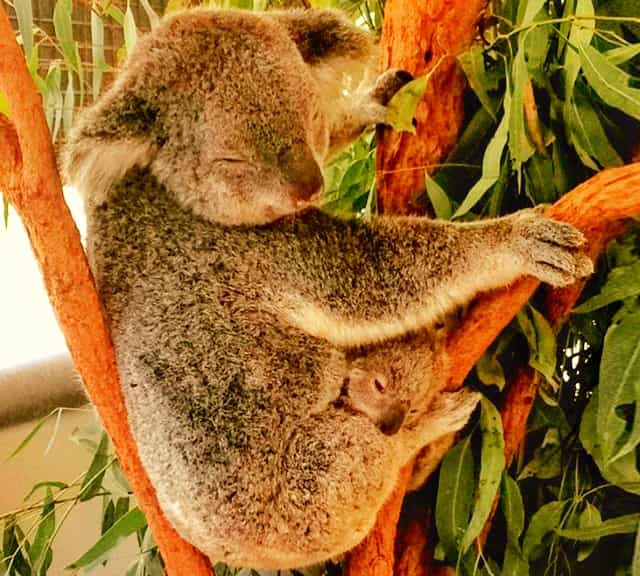
After the gestation period (at birth), the neonate koala joey is just the size of a jelly bean. Usually; a female koala gives birth to a single neonate, however; twins (rare) and triplets (rarest) have also been recorded as well. These neonates are the size of a jelly bean at the time of birth, as they are roughly 19 millimeters in length and about half a gram in weight.
After the gestation period, a female koala usually gives birth to a single neonate. However; twins and triplets have also been recorded but they are very rare.
As mentioned earlier, these neonates are still in embryonic form even after the birth as none of their body parts are even fully developed. For this reason, all the marsupial mammals including koalas are considered inferior mammals as compared to the placental mammals because placentals have highly developed body structure at the time of birth.
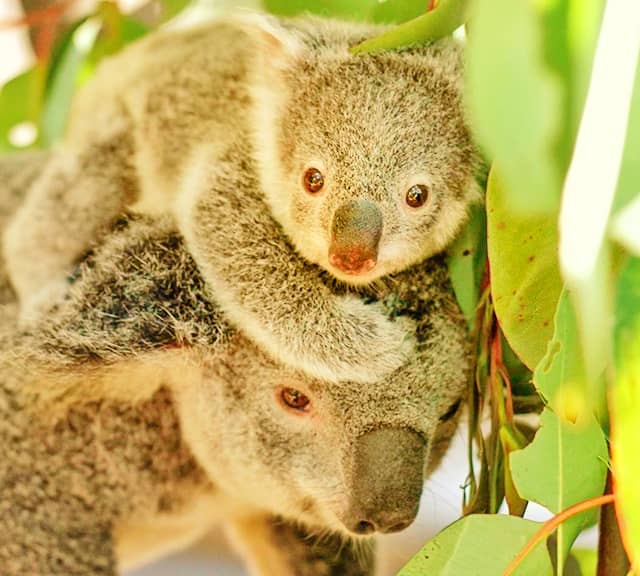
Right after the birth, the neonate koalas travel straight up to its pouch. Even though their forelimbs are under-developed at birth but they are still handy to help them reach their mother's pouch. They also have a good sense of smell which really assist them to locate their mother's pouch. Inside the mother's pouch they directly search their mother's teat and upon finding it, they attach their mouth to it and keep suckling the milk.
Even though koalas have brief gestation period and their newborn neonates are under-developed, they still have good sense of smell which help them to reach their mother's pouch.
Inside their mother's pouch they transform into the koala joey from a being a jelly-bean neonate. The neonates entirely stay inside their mother's pouch unless they are 6 months old. After the sixth month, a joey may occasionally start exploring the outer world from its mother's pouch.
After Gestation Period of Koalas
The Under-Developed Neonate can still climb up the Pouch
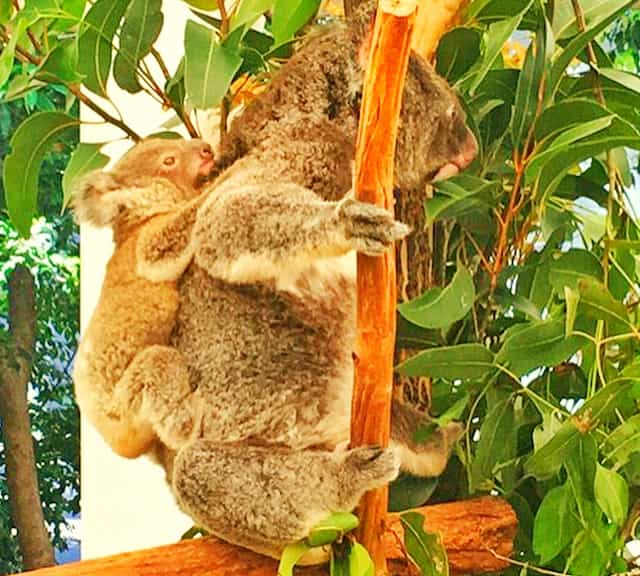
Liger Articles
Marsupials vs. Placental Mammals
Koalas are most popular animals in Australia
Koalas are more popular as compared to Kangaroos
Koalas and their Dominant Nose
Button Shaped Fascinating Eyes of the Koalas
Core Recognizing Features of Koalas
Koalas are the largest tree climbing Mammals in Australia - Koalas as Arboreal
Sizes of Koalas from Queensland, Australia
Sizes of Koalas from Australia's Victorian Origin
Difference between Queensland and Victorian Koalas
Average Weights of Male Koalas
Weighing Male vs Female Koalas
Male Koalas have Loudest of voice among all Australian Mammals
Origin of Koalas & their Evolution
Koalas Population Increased at the end of 20th century
Historical Evolution of the Koalas - A Physical Perspective
Koalas and their Aboriginal and Native Names
It Took 10 years for Aboriginal Australians to Spot and Recognize Koalas
Koalas Live Hardest and Toughest Lives Among all animals
Koalas Tooth Decay through its Abrasive Diet
Koalas Diet is Fully Poisonous and Toxic
Koalas' Food Eucalyptus has Lower Nutrition
Koalas have Lower Energy Levels
Koalas - When Occasionally Spotted on other Leaves for their Food
Why Koalas drink little or no Water?
Koalas & their Advanced Digestive Mechanisms
Why Koalas Sleep more than 20 Hours a Day?
Koalas Lack Energy and Strength
Koala's Tooth from Growth till Tooth Decay
Young Koalas are Better Chewers as Compared to Mature and Elderly Koalas
Why Most Koalas Die of Starvation?
Heat Exhaustion and Heat Strokes among Koalas
Do Koalas lack Intellectual Abilities?
Koalas and their Sense of Smell
Koalas Love Fresh Eucalyptus Leaves as their Food
Koalas' Eucalyptus Leaves' Preferences during summers and Winters
Koalas' Preference for Leaves Having Higher Nitrogen Levels
Koalas Prefer Big Eucalyptus Trees and Love to Stay at Trees' tops.
Koalas Prefer to Live in Areas that have Good Soil and Fertile Lands
Koalas' Per Day Food Consumption
Koalas Food Consumption Depends upon their Body Size
Lactating Female Koalas Consume More Food as Compared to the Normal Female Koalas
Koalas Consume More Food during Winters as Compared to Summers
Female Koalas are very Selective Regarding their Leaf Selection and Food Consumption.
A Baby Koala Joey Lives in her Mother's Pouch for 8 to 9 Months
Gestation Period within Female Koalas
Breeding Behaviors of the Female Koalas
The Size of the Baby Koala Joey at the time of its Birth
Weight of the Baby Koala Joey at the Time of its Birth
At Birth the Baby Koala Joey Travels from Cloaca into their Mother's Pouch
Newborn Koala Joeys have Well-Established Sense of Smell
Koala Joey keeps his Head Inside its Mother's Pouch for 6 Months
Complete Shape and Body Development of the Koala Joey
Pap - The first solid food of the Koala Joeys
When Does Tooth Emerge for Baby Koala Joey?
Aggressive Behavior of Mother Koalas towards their Joeys
Queensland Offers Less Nutritional Values for Koalas
How long does Koalas live? Age of the Koala
Female Koalas Live More than Male Koalas
What is the Average Age of the Male Koala?
Average Ages of the Female Koalas
For How Long a Female Koala can Give Birth to the Koala Joeys?
How many times female Koalas give birth?
Koalas and Australia's Bushfire
Koalas' fur quickly gets rid of rain water
Koalas Resting and Sleeping Postures and Positions during the Hot Summer Seasons
Winter Season and Sleeping Postures of Koalas
Koalas' Urination during Summer and Winter Seasons
Koalas and their Specialized Claws
How does a Koala regulate its Body Temperature?
Food Consumption and Feeding Timings of the Koalas
Koalas Always Prefer Eucalyptus Leaves from the Tree top
How does a Koala Grooms itself?
Koalas' Territories and ranges within Australia's Victorian Areas
Koalas' Territories and Ranges within Australia's Queensland Areas
Behavior of the Alpha Dominant Male Koala
Aggressiveness of Female Koalas
Scent Marking Behavior of the Male Koalas
Mating Strategy of the Male Koalas
Fights and Territorial Encounters of Male Koalas
Sounds and Vocalizations of Male Koalas
Sounds and Vocalization of the Female Koalas
Koalas and their Facial Expressions
Breeding Ages of the Male and Female Koalas
Factors Influencing the Success of Koalas' Fertility Rates
Behavior of the young and adolescent Koala Joey
When Does a Mother Koala Says Goodbye and Leaves the Young Koala Joey?
Playful Behavior of the Young Koala Joeys
Koalas - Mating Season and Mating Months
Koala Informationen, Bilder, Neuigkeit, und Erforschung
Коала - сумчатый млекопитающий